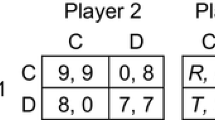Abstract
Cooperation is the foundation of human social life, but it sometimes requires individuals to choose against their individual self-interest. How then is cooperation sustained? How do we decide when instead to follow our own goals? I develop a model that builds on Bacharach (in: Gold, Sugden (eds) Beyond individual choice: teams and frames in game theory, 2006) ‘circumspect we-reasoning’ to address these questions. The model produces a threshold cost/benefit ratio to describe when we-reasoning players should choose cooperatively. After assumptions regarding player types and beliefs, we predict how the extent of cooperation varies across games. Results from two experiments offer strong support to the models and predictions herein.
Similar content being viewed by others
References
Ainslie G. (1992) Picoeconomics. Cambridge University Press, Cambridge
Altshuler D., Dickson W., Vance J., Roberts S., Dickinson M. (2005) Short-amplitude high-frequency wing strokes determine the aerodynamics of honeybee flight. Proceedings of the National Academy of Sciences USA 102: 18213–18218
Bacharach M. (2006) Team thinking. In: Gold N, Sugden R (eds) Beyond individual choice Teams and frames in game theory. Princeton University Press, Princeton and Oxford, pp 120–155
Bergstrom T. (2003) The algebra of assortative encounters and the evolution of cooperation. International Game Theory Review 5: 211–228
Binmore K. (1992) Foundations of game theory. In: Laffont J. J. (eds) Advances in economic theory. Cambridge University Press, Cambridge
Brosig J. (2002) Cooperative behavior: Some experimental results in a Prisoner’s Dilemma game. Journal of Economic Behavior and Organization 47: 275–290
Butler D., Burbank V., Chisholm J. (2011) The frames behind the games. Journal of Socioeconomics 40: 103–114
Butler D., Loomes G. (2007) Imprecision as an account of the preference reversal phenomenon. American Economic Review 97: 277–297
Colman A. (1995) Game theory and its applications in the social and biological sciences. (2nd ed.). Butterworth-Heinemann, Oxford
De Cremer D., Van Vugt M. (1999) Social identification effects in social dilemmas: A transformation of motives. European Journal of Social Psychology 29: 871–893
Dufwenberg M., Kirchsteiger G. (2004) A theory of sequential reciprocity. Games and Economic Behavior 47: 268–298
Dunbar R., Shultz S. (2007) Evolution in the social brain. Science 317: 1344–1347
Ellington C. P. (1984) The aerodynamics of hovering insect flight. Philosophical Transactions of the Royal Society of London B 305: 1–15
Gauthier D. (1986) Morals by agreement. Clarendon Press, Oxford
Gauthier, D., Sugden, R. (eds) (1993) Rationality, justice and the social contract: Themes from ‘morals by agreement’. Harvester Wheatsheaf, London
Gold N., Sugden R. (2007) Collective intentions and team agency. Journal of Philosophy 104: 109–137
Hamilton W. D. (1964) The genetical evolution of social behavior. Journal of Theoretical Biology 7: 1–52
Hollis M., Sugden R. (1993) Rationality in action. Mind 102: 1–35
List J. (2006) Friend or foe? A natural experiment of the Prisoner’s Dilemma. Review of Economics and Statistics 88: 463–471
Magnan A. (1934) La Locomotion Chez les Animaux. Hermann, Paris
Marwell G., Schmitt D. R. (1975) Co-operation: An experimental analysis. Academic Press, New York
Nowak M. (2006) Five rules for the evolution of cooperation. Science 314: 1560–1563
Nozick R. (1993) The nature of rationality. Princeton University Press, Princeton
Price M., Cosmides L., Tooby J. (2002) Punitive sentiment as an anti-free rider psychological device. Evolution and Human Behavior 23: 203–231
Rabin M. (1993) Incorporating fairness into game theory. American Economic Review 83: 1281–1301
Rapoport A., Chammah A. (1965) Prisoner’s Dilemma: A study in conflict and cooperation. University of Michigan Press, Ann Arbor
Rohrbaugh M., Mehl M., Shoham V., Reilly E., Ewy G. (2008) Prognostic significance of spouse we talk in couples coping with heart failure. Journal of Consulting and Clinical Psychology 76: 781–789
Ross D. (2007) Microexplanations. MIT Press, Cambridge
Roth A., Murnighan J.K. (1978) Equilibrium behavior and repeated play of the prisoner’s dilemma. Journal of Mathematical Psychology 17: 189–198
Sally D. (1995) Conversation and cooperation in social dilemmas: A meta-analysis of experiments from 1958–1992. Rationality and Society 7: 58–92
Savage L. J. (1954) The foundations of statistics. John Wiley, New York
Simpson B. (2006) Social identity and cooperation in social dilemmas. Rationality and Society 18: 443–470
Sugden R. (2003) The logic of team reasoning. Philosophical Explorations 6: 165–181
Thaler R., Camerer C. (2003) In honor of Matthew Rabin: Winner of the John Bates Clark Medal. Journal of Economic Perspectives 17: 159–176
Tomasello M., Carpenter M., Call J., Behne T., Moll H. (2005) Understanding and sharing intentions: The origins of cultural cognition. Behavioral and Brain Sciences 28: 675–691
Tversky A., Kahneman D. (1992) Advances in prospect theory: Cumulative representation of uncertainty. Journal of Risk and Uncertainty 5: 297–323
Van Huyk J., Battalio R., Beil R. (1990) Tacit coordination games, strategic uncertainty and coordination failure. American Economic Review 80: 234–248
Van Vugt M., Van Lange P. (2006) The altruism puzzle: Psychological adaptations for pro-social behavior. In: Schaller M., Kenrick D., Simpson J. (eds) Evolution and social psychology. Psychology Press, New York, pp 237–261
Zizzo D., Tan J. (2007) Perceived harmony, similarity and cooperation in 2 × 2 games: an experimental study. Journal of Economic Psychology 28: 365–386
Author information
Authors and Affiliations
Corresponding author
Electronic Supplementary Material
The Below is the Electronic Supplementary Material.
Rights and permissions
About this article
Cite this article
Butler, D.J. A choice for ‘me’ or for ‘us’? Using we-reasoning to predict cooperation and coordination in games. Theory Decis 73, 53–76 (2012). https://doi.org/10.1007/s11238-011-9270-7
Published:
Issue Date:
DOI: https://doi.org/10.1007/s11238-011-9270-7




